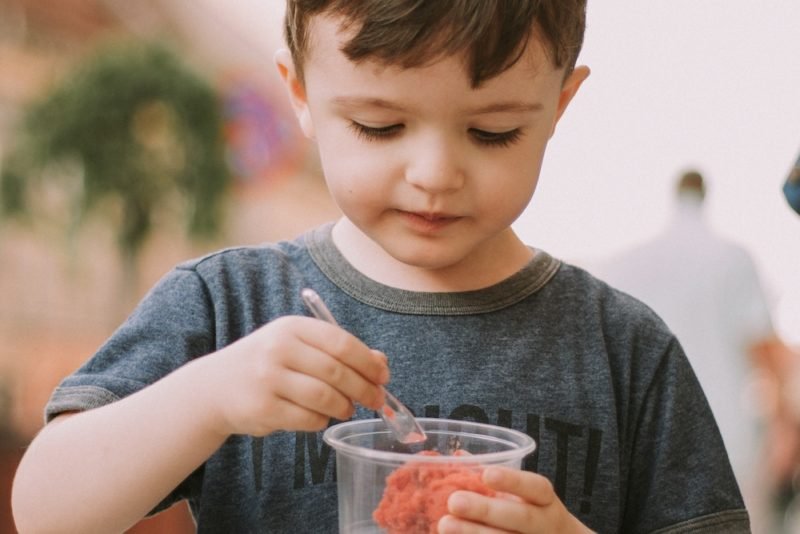
Disclaimer: I don’t have kids. But that doesn’t mean that I don’t have a strong professional (and personal) opinion on talking to kids about weight. My opinion is based on the substantial body of research demonstrating the negative—and likely unintended—impact of childhood weight comments, as well as my personal experience as a child who’s body was commented on frequently, and my professional experience helping clients who are still dealing with the aftershocks of being told they were a fat child (and often forced to go on a diet), 30, 40, 50 even 60 years later.
It’s a topic I’ve written about (see “What to say (or not say) to your overweight child” in The Washington Post and “Raising intuitive eaters” in Today’s Dietitian magazine). Other good articles, which I did not write, include “Parents should avoid comments on a child’s weight” in The New York Times.
I liked this article because, instead of just reporting on a research study that had recently came out, the reporter interviewed experts about what you could do if your child’s weight may be in a range that might impact their future health. In other words, taking the focus off weight and fostering healthy behaviors for everyone in the family, since parents are models for their kids and—hello—everyone can benefit from eating well, being active, and otherwise taking care of themselves. This is often referred to as being “weight neutral” or “weight inclusive.”
The whys of weight inclusivity
Weight inclusivity–making room for and being accepting of people of all shapes and sizes—is an important mindset no matter what you weigh, for a few reasons:
- Even if you would like to weigh less than you do now—or feel that you “should” way less than you do now—eating nutritious food and exercising in a way that brings you joy may or may not result in a change on the scale, but it will have health benefits. It will probably also make you feel better. That’s of tremendous value. Being weight neutral/inclusive towards yourself can help you not give up on nutrition and movement if they don’t lead to weight loss, and it can help you sidestep internalized weight stigma. Internalized weight stigma can be even more insidious and damaging than weight stigma coming from other people, from the media, or from society at large. It can also help prevent yo-yo dieting and weigh cycling, which is also damaging.
- Even if you are satisfied with what you weigh, fear of weight gain can do a real number on your head, and impair your quality of life. I experienced this when I was at my lowest weight, and I’ve met women in smaller, fit bodies who at times are absolutely paralyzed by the fear of not remaining in a smaller, fit body. So becoming weight inclusive might benefit you, but it will certainly benefit those in larger bodies who you might—consciously or unconsciously—judge and possibly discriminate against.
Cultivating Intuitive Eating
Another article from a few years ago that I really liked was, “My 5-year-old refused to eat the healthy dinner I cooked. Here’s why I let her,” in The Washington Post. I thought this article was a wonderful representation of why it’s important (even when it feels hard) to raise children—no matter what they weigh—to be intuitive eaters. Babies and small children are natural intuitive eaters, turning their heads away from the breast or bottle when they’ve had enough, or eating two bites of their dinner one day and cleaning their plate the next. Studies that have measured how much toddlers eat intuitively find that while calories may fluctuate widely from day-to-day, over the span of say, a week, they average out to being just right. The same would be true for you, too, if you learn to eat intuitively instead of deciding how much you “should” eat based on external measures, like a calorie count.
In my adult clients today, I see the ramifications of damage done long ago by parents who put them on diets when they were children or forced them to clean their plates. The damage is particularly acute when they were the “only heavy child” in their family and were treated differently in terms of comments and what foods they were allowed to eat.

My story, briefly
In my own life, my father commented on my weight from at least early grade school onward (looking back at photos, I may have had a few extra pounds, but would likely have grown out of it if left alone, or maybe not…it really should not have mattered). I was forced to go jogging in the heat of California summers when I was in third grade (which formed a lifelong distaste for running), then signed up for Jazzercise classes (I hated the leotards), then pushed to Weight Watchers when I was 15. This was all my father’s doing, but my mother who was a chronic dieter, so that had had some impact, too, even though it was unintended.
[Side note: I was so “successful” at losing weight as a teen on Weight Watchers, that my English teacher, a kind, lovely man, asked the school counselor to talk to me because he was afraid I might be developing an eating disorder. I was touched by his concern, but my father was deeply offended.]
On the flip side, I remember my father forcing me to sit at the dinner table for what felt like hours (I’m sure it wasn’t nearly that long) until I ate most of whatever it was I didn’t want to eat (usually fish…I hated fish growing up). If I held firm and didn’t eat it (I honestly felt like I would be sick if I did), I was sent to my room as punishment. Way to squash intuitive eating! I was talking to my mother about this recently (my parents divorced when I was in 8th grade), and she said she was so mad at my father when he did that.
Words wound…and the scars are slow to heal
I see the ramifications of weight-related comments and forced eating in childhood with my adult relationship with food—although much less so, now, due to the work I’ve done—and I see it clearly in my clients. If the parents of today take a different tack, remaining weight neutral, encouraging fun physical activity as a family, and following Ellyn Satter’s guidelines for division of responsibility (parents decide what food will be served and when it will be served, children decided how much of it to eat), there will be less need for the work I do today.
But there is a need, and that’s why I do the work I do, and why I became a Certified Intuitive Eating Counselor and a Licensed Be Body Positive Facilitator. And it’s why I remain alert to adult manifestations of childhood food- and weight-related trauma in my own life, and those of my patients. Even when you know it, and see it, it’s tricky to unravel it, sadly. But there’s always hope! We should all be able to enjoy a slice of chocolate cake at a picnic without even the teeniest shred of guilt!

Disclaimer: All information provided here is of a general nature and is furnished only for educational purposes. This information is not to be taken as medical or other health advice pertaining to an individual’s specific health or medical condition. You agree that the use of this information is at your own risk.
Hi, I’m Carrie Dennett, MPH, RDN, a weight-inclusive registered dietitian, nutrition therapist and body image counselor. I offer compassionate, individualized care for adults of all ages, shapes, sizes and genders who want to break free from eating disorders, disordered eating or chronic dieting. If you need to learn how to manage IBS symptoms with food, or improve your nutrition and lifestyle habits to help manage a current health concern or simply support your overall health and well-being, I help people with that, too.
Need 1-on-1 help for your nutrition, eating, or body image concerns? Schedule a free 20-minute Discovery Call to talk about how I can help you and explore if we’re a good fit! I’m in-network with Regence BCBS, FirstChoice Health and Providence Health Plan, and can bill Blue Cross and/or Blue Shield insurances in many states. If I don’t take your insurance, I can help you seek reimbursement on your own. To learn more, explore my insurance and services areas page.
 Print This Post
Print This Post






